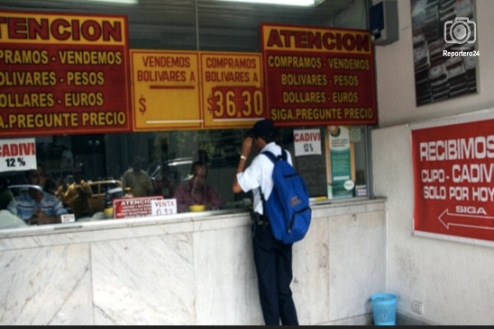For those who think that our currency is worth less, here is how distortions can make Bolívars be worth actually more. Yes, in the ultimate arbitrage (or inverse arbotrage?) opportunity, you can sell Bs. 1 million for Bs. 1.1 at the border, you hand in bills and the foreign exchange houses in Cucuta give you an instant transfer of your Bs. 1.1 into your Venezuelan bank account. This transaction called the “Cambiazo”, has been the rage at the border in the last few weeks.
The reason for this? Simple, Colombians going to Venezuela to buy goods need currency, bills, they don’t want to use their Colombian credit cards, which register operations at the official rate of exchange. As the black rate has soared, the incentive to go and buy goods in Venezuela has increased to the point that there is actually a shortage of bills at the border, creating this new arbitrage which remarkably makes the Bolívar actually stronger. Since the difference between the official rate of exchange and the black rate is a factor of ten, then goods are still cheap, even if the merchant is making a 200% profit and you pay 10% more for the Bolivars.
Another market solution by inventive Venezuelans and Colombians to a problem created by the excessive controls in Venezuela. Sort of like reverse arbitrage. Is this a first instrument of its kind in the world?


December 19, 2013 at 3:33 pm
Any coincidence?
http://www.eluniversal.com/internacional/131219/cuba-elimina-restricciones-para-compra-de-vehiculos-al-estado
December 18, 2013 at 12:57 pm
The amounts of these transactions have to be HUGE– with 50% inflation I would think incentives to cross the border seeking for a small profit in VEF are not very high.
December 18, 2013 at 12:52 pm
This is OT but could you explain it a bit, Miguel?
http://economia.elpais.com/economia/2013/12/18/actualidad/1387384592_169507.html
I know nothing about banks but I guess Banesco, like others, is these days a set of companies spread around the world. So I guess: most of the dosh might come from Banesco companies outside Venezuela, right?
And how close is this bank to Chavismo? Thanks
December 18, 2013 at 1:29 pm
I dont think this bank is as close to Chavismo as people suggest. They have been in an internationalization campaign for a while. They now have banks in Curacao, USA, and this is the second bank in Galicia they buy. The strategy makes sense seeing the black future in Venezuela.
December 18, 2013 at 1:40 pm
Thanks. That makes sense indeed.
December 18, 2013 at 11:35 am
OT: Escape from Bolivia. The rescue was done by former Seals… directed by my good friend from Miami. Sorry about Sean Penn
http://www.miamiherald.com/2013/12/17/3823594/bolivia-says-new-york-businessman.html
December 18, 2013 at 2:36 am
This is basically a fee for delivering cash to where it’s needed. It’ll disappear the moment Venezuelan stores have been bled dry of merchandise – mid-January at latest.
December 18, 2013 at 11:11 am
Excellent point!
December 18, 2013 at 1:11 am
Oh the always unintended consequences of communist econo-engineering.
December 17, 2013 at 10:22 pm
At least, a “dirty” reverse arbitrage, because you need to bring the bills across the border (it poses some degree of risk)
Another factor is the limit imposed by banks on the amount of bills you can take from Venezuelan banks located near to the border (I guess 5 to 10 k Bs per transaction)
But it´s even a good example of practical ways to solve market frictions
December 17, 2013 at 8:45 pm
The excess of money supply just finds its way trough endogenous money demand. Venezuela is now like a laboratory for extreme experimental economics. Good for a growing group of economic agents (but always a minority) able to make huge profits. Ironies of the 21st century socialism where some people become rich faster than any other country. Surely, the INE does not account for this kind of arbitrage profits in the statistics of income distribution… tic tac tic tac tic tac …
December 17, 2013 at 7:00 pm
Why don’t the houses in Cucuta lower the exchange rate to receive more Bs?